

A quarter-century ago, images of emaciated children locked in Romania’s stark orphanages were broadcast around the world, crying out for a compassionate response. World Vision responded, launching innovative solutions for thousands of orphans — and other vulnerable children as well.
With its undulating hills, imposing castles, and quaint cottages, many parts of Romania seem to step out of a fairytale. Yet the charm belies a nation battered for decades at the hands of ruthless Communist rulers.
In the 1980s, former President Nicolae Ceausescu and his wife, Elena, lived in extravagance while the nation cowered in fear and poverty. Finally, the people unleashed the courage to overthrow communism, executing Ceausescu and his wife on Christmas Day 1989. But the terror lived on — notably for tens of thousands of Romania’s innocent children. Ceausescu’s legacy became international news as the world witnessed the shocking images of abandoned children tethered to beds and confined to cages in overcrowded institutions. No fairytale façade could hold back the nightmarish reality for these children.
World Vision was one of the first humanitarian organizations to respond to the dire needs of institutionalized children, and it’s one of the few international organizations still serving in Romania. The child protection and childcare models World Vision launched have proved so effective that the Romanian government adopted them throughout the country.
Romania’s former Secretary of State for Social Assistance Theodora Bertzi says, “World Vision continues to have a strong presence and concern with ensuring the well-being of the most vulnerable children — even when other organizations have closed.”
Yet much remains to be done in a country still in transition. Formerly institutionalized children are now adults facing an uncertain future. Romania’s entrance into the European Union brought both opportunity and challenge. Meanwhile, rural families remain in persistent poverty, and the children continue to need innovative solutions to ensure a stable future.

The nostalgic beauty of Romania’s landscape and traditional lifestyle is marred by the reality of extreme poverty in rural areas.
Children without Roots
As communism gasped its final breaths in Romania, a newborn drew her first breath and wailed. Hours later, her mother fled the Transylvania hospital, leaving her infant behind. Overwhelmed by large families due in part to Ceausescu’s reproduction policies, untold thousands of parents — most of them living in poverty’s relentless clutch — left their children at the doorstep of the nation’s many orphanages.
Today, that baby is a young woman who bears the psychological and social scars that mar the tens of thousands of children consigned to Romania’s notorious orphanages.
When Andreea* turned 18, the orphanage released her to the streets. The only things she took with her were the few possessions she owned and her rage, which had built over two decades of being locked in crowded rooms with other unwanted children. She stood on the unfamiliar street, utterly unprepared for life. Andreea, now 24, had never been to a grocery store or handled money. She had no idea how to cook a meal or wash her clothes. She had no job skills, no place to live, and no ability to access social services.
After surviving a childhood devoid of love, Andreea also had nowhere to turn for help. “I always wanted to know who my parents were,” she says, explaining how she used to see other parents visit their children in the orphanage. “I stood at the door waiting for my parents. But they never came. I would cry.”
Andreea would later learn that she has five brothers — and that only she and one brother were institutionalized. For years, Andreea steeped in despair at her abandonment. “I didn’t feel happiness. I was afraid,” she says.
Children like Andreea, who learned to rock themselves because no one else would give them comfort, were commodities. Earmarked as the future factory workforce that leaders calculated would make Romania an economic power, the children relegated to orphanages were underfed, understimulated, and undereducated. But then the rest of the world discovered them, setting off a groundswell of support.
Hope for Forgotten Children
World Vision had a small staff on the ground in Romania as dissent boiled over in late 1989. Within months of the fall of communism, ABC’s “20/20” program documented life inside the orphanages, including an interview with a World Vision staff member who had gained access to the highly restricted institutions.
World Vision began working with the government and other nonprofit organizations, first gaining trust by improving conditions in the orphanages. Staff also set the foundation for groundbreaking alternatives to institutionalization that flourish today. These new models were designed to replicate family environments, encouraging healthy child development. Among the earliest successes was a foster home system for many children who could not be reintegrated into their families.
Niculina Petre, a former director in Romania’s Child Protection System, says World Vision brought the “know-how and human and material resources” to make significant advances in how abandoned children were treated for decades in Romania. “World Vision proved the viability of a new child protection system and became the foundation for the Romanian government to change,” Niculina says.
When child protection reform became a government priority, World Vision was invited to participate in the process and influenced innovative and sweeping legislation that passed in 1997.
In addition, maternity support and shelters — including therapy for children with disabilities and counseling for their mothers — provided the critical care to keep parents from abandoning their children. And to protect young people like Andreea as they emerged from orphanages, World Vision created Hope House.
Andreea lived at Hope House for more than two years, learning skills and anger management to help her transition to life on her own. Now three crosses dangle on cords around her neck, a constant reminder of the most precious truth Andreea says she learned at Hope House. “My inner strength, my optimism are from God. My trust is in God,” she says with a brilliant smile.
Andreea and her 23-year-old friend, Sabina*, share parallel life stories. Relegated to an orphanage shortly after birth, Sabina also was unprepared when she was released at 18, and she stayed at Hope House for a year to master new skills.
World Vision staff helped Sabina secure an internship at a local food company, where she was soon hired full time. Her manager praises her work. For Sabina, life in the orphanage is something she tries to forget. “What has been has been,” she says.
The shy Sabina and outgoing Andreea live together in a modest apartment in the city of Cluj’s largely abandoned industrial area. Rent is reasonable here, and their peach-washed building is a bright spot in the otherwise drab surroundings of decaying brick and shattered windows. Despite their environment, Andreea and Sabina dare to dream about the future.
Sabina is determined to have an apartment of her own. Andreea plans to advance in her job of sewing clothes, with a goal of “helping people who went through what I went through.”
Children still are institutionalized, but in “placement centers” — equipped facilities with trained staff — not the cruel child warehouses of the past. Hope House’s former work of preparing young people with core life skills is now part of children’s ongoing education in some of the placement centers.
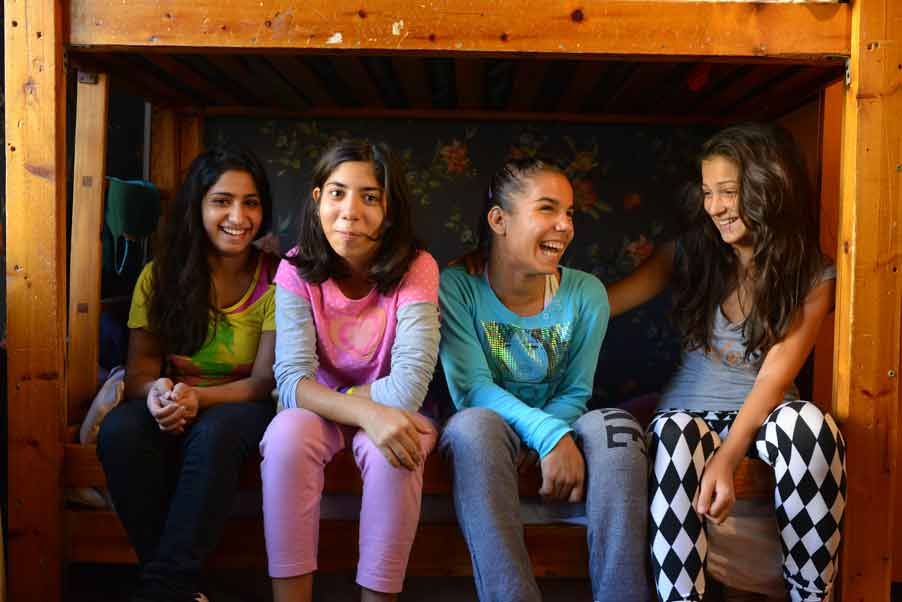
Group homes give young people a fresh start and a built-in community of support.
A Place to Call Home
World Vision also collaborates with the government to test group homes as an alternative for children growing up in placement centers. In Bucharest, five apartments house 40 children, segregated by gender and managed by live-in caretakers.
The children decorate their rooms, go on field trips, attend regular schools, help each other with homework, buy and prepare food, and do laundry. The group homes are just minutes from one another so the young people gather often for activities and meals. Some are siblings; a few have disabilities. But they all function as a family, helping and protecting one another.
The young people share stories of how Romania’s child protection officers removed them from their families’ appalling living conditions. Others were abandoned. Some of their parents are incarcerated.
Casandra*, 16, grew up in a tent with her impoverished parents and 11 siblings. Her illiterate parents didn’t send their children to school. Casandra and her older siblings spent their days caring for the younger children or scavenging for discarded iron, plastic, paper, or anything else to recycle for money. In 2006, the Romanian government placed Casandra and three younger brothers in an orphanage.
Casandra seldom sees her parents, who move around to find work. But she frequently spends time with her 12-year-old brother, Sandu*, who lives nearby in one of the homes for boys.
The dark-eyed teen with long, thick hair says she’s happy in the group home. Casandra attends school, competes on a dance team, and plans to one day work as a reflexology masseuse. “This is a totally different life,” she says with a smile. “Here we try to have life in a family", and we learn life skills. In the orphanage, I was just one of the crowd.”
Of the five group homes in Bucharest, the government’s child protection office has assumed ownership of two apartments. World Vision is preparing to transition the other three as well, freeing the organization to focus on other vulnerable children.
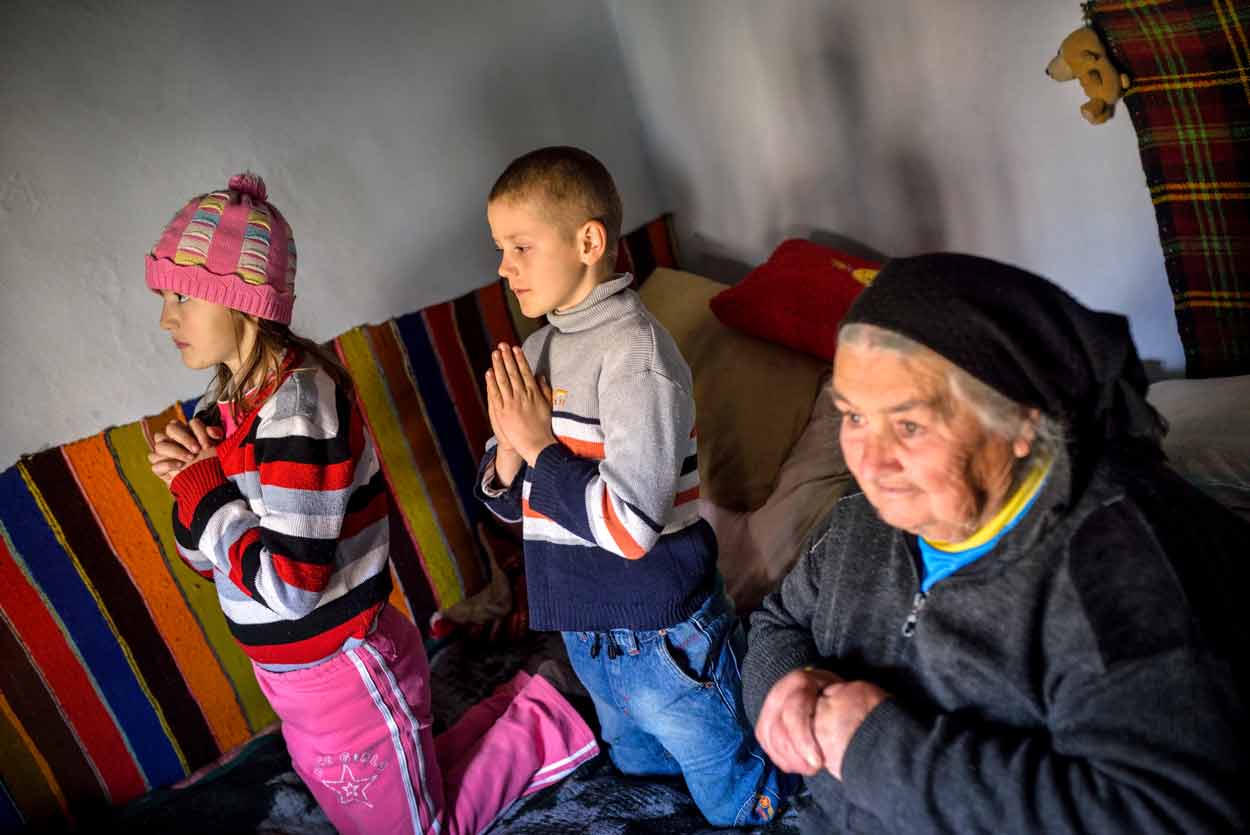
Janeta Gilca praying with her grandchildren, Parascheva, 11, and Toader, 9, in their home in Vaslui, Romania.
Abandoned Once More
Romania joined the European Union in 2007, which opened its borders and attracted foreign investment. But because it’s the poorest nation in the EU, jobs and income-generating opportunities remain limited in rural areas. This has created a new problem.
At least 2 million Romanian adults have crossed into Italy, Spain, and other countries in search of higher paying jobs, often leaving their children behind with aging grandparents or older siblings. In Romania’s remote northeast Vaslui County, where more than 27,000 adults left in 2010 alone, children are especially vulnerable to this new form of abandonment.
At 78, Janeta Gilca is caring for two — 9-year-old Toader and 11-year-old Parascheva — in the low-ceilinged, two-room cottage she’s lived in for 35 years. Janeta has hypertension and diabetes, and her only prayer is that she lives long enough to see her grandchildren finish high school. Without her, the children have no immediate family nearby.
Janeta’s son and older grandchildren work in a rubber factory in the Czech Republic, sending her $250 a year to help support the grandchildren. The children’s mother initially stayed to care for them, but soon left to live with another man.
When Janeta’s son left, he gave her two pigs, which produced 15 piglets. One by one, Janeta has been forced to sell them. Now only one pig is left. Janeta stares at the floor and shakes her head. “I do not have the heart to think of myself. I think only of my grandchildren,” she says, wiping tears from weary eyes.
Parascheva and Toader study hard in school, earning A’s and B’s. They worry about their grandmother and help out by doing chores — feeding the pig, making the beds, hanging the wash to dry, and tidying up the small yard. They say Janeta is kind and patient.
The sun provides no warmth as Janeta walks cautiously out to the yard, supported by her cane. Framed against the white house with a green door, she looks up and jabs a crooked forefinger toward the heavens. “Our faith is there,” she says.
World Vision recently began working in Vaslui 2, a U.S.-funded development project that uses child sponsorship support to address education, child protection, economic development, and Christian faith.
Toader is newly sponsored, but Parascheva and many other Vaslui 2 children have no sponsors yet. When they are linked with U.S. sponsors, some of their prayers for help will be answered.
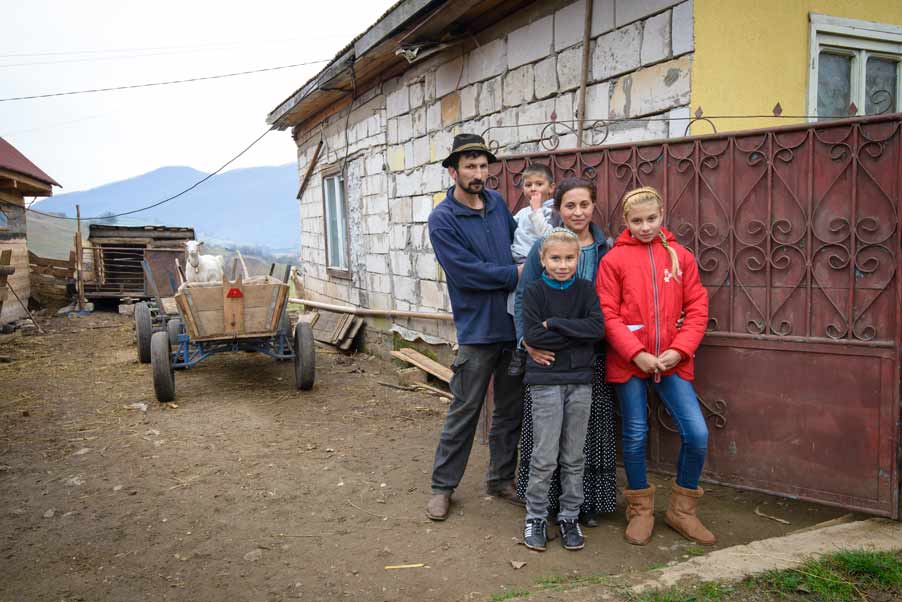
The Adam family looks forward to a better future with the help of sponsorship and agricultural opportunities.
Fortifying Fragile Families
Since the fall of communism, Romania has become a nation of contrasts. Joining the EU benefited many urban areas with billions of dollars in aid for rebuilding sagging infrastructure. Yet seven years later, many rural families barely survive in poverty. These include Roma families, an ethnic group marginalized in Romania for centuries.
Roma children experience deep discrimination and poverty. Families in remote, underdeveloped regions lack basics like running water and decent housing. Many are farmers who could capitalize on their crops, livestock, and other products if they had access to markets — but most do not.
The Adam family barely makes ends meet in rural Transylvania. A horse and cart serve as their only mode of transportation. The three children are sponsored and receive clothing and school supplies. In 2012, World Vision provided the family with six goats, which produced four kids. The Adams shared two with other families in need. This is part of a growing World Vision livestock program, designed to not only give children milk and cheese to eat at home, but also to expand small farms so parents can sell their animal products.
Soon the Adam family also will be part of a local cooperative World Vision is helping organize so that rural farmers can work together, pool their products, and ultimately have greater access to profitable markets. Florin Adam, 36, does day jobs to trade for goods or earn cash while he waits for the cooperative’s legal paperwork to move through the regional courts. “If I am part of this, I will be able to afford more goats and increase what we can sell,” says Florin.
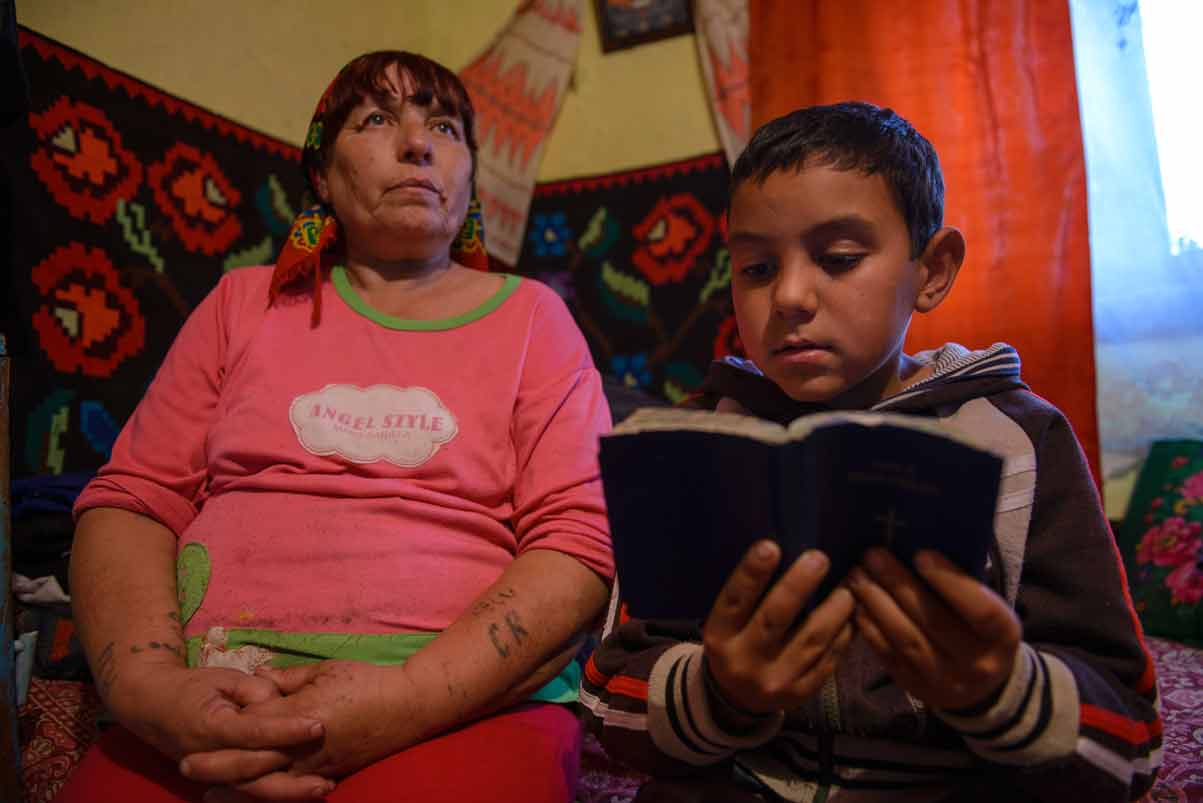
Antonio Moldovan, 11, reads Bible stories to his grandmother, who is illiterate.
Breaking Poverty’s Stranglehold
For generations, Roma families have lived in isolation from the rest of Romanian culture, clustered in extreme poverty. This is the case in Camarasu, another rural Transylvania town of 2,000, where World Vision is helping the mayor make big changes.
In a significant departure from the norm, Mayor Marcel Mocean demands that Roma families are treated like the rest of the community. He says his faith dictates this. Once he took office, the mayor welcomed World Vision into the community, and today, 254 children are sponsored, including 100 Roma.
World Vision is partnering with the Camarasu community and its mayor to ensure all families have access to running water, electricity, agricultural development, and economic opportunities. Donations from World Vision’s Gift Catalog also provide cows to qualifying families, and some of the calves are given to others who are trained in caring for livestock.
The mayor’s goal is to equip and educate the next generation, including Roma children. “All we own belongs to God,” Marcel says, “and we are responsible for the children. They are a gift.”
World Vision and the mayor’s office also built a learning center for Roma children in first through eighth grade, who gather each day after school. Staff members help the children with their homework, provide snacks, and, on occasion, distribute warm clothing provided by corporate donations. The center is widely seen as a major step toward breaking the cycle of poverty that afflicts most local Roma families with illiterate parents.
Among the children who spend time at the center is 11-year-old Antonio Moldovan, who prefers the Bible when it’s time to practice reading. Antonio lives in a two-room house with his family of eight, including his grandparents.
The adults can’t read, so when Antonio’s grandmother received a Bible from a local church, Antonio began reading Scripture to her. His favorite Bible story is David and Goliath. “It’s a great battle between a giant fighter and a little guy. And the little guy wins,” he says with a grin.
On a recent day, as he does nearly every day, Antonio nestled on a bed next to his grandmother and read the Bible aloud. His grandfather listened too, tears spilling from his eyes.
“We are happy someone can read to us,” says Antonio’s mother, Minerva. “By listening, we understand what is good and bad, and we think about God and faith.”

Sorin Popovich and his son, Danut, care for the family’s major source of income — 100 hives that produce generous quantities of honey.
A Sweet Solution to Poverty
If rural families are to stay together, they need to leverage local natural resources — even if they don’t own large parcels of land. In Vaslui County’s Negresti community, that takes the form of beekeeping. Negresti is close to the forests and fields bees need to produce honey.
World Vision provides entrepreneurial families with training, hives, and equipment to launch a beekeeping business. Once trained, the beekeepers receive five hives and can join a local association to share information and learn new techniques for expanding their hives and selling honey.
In his tidy home, 46-year-old Sorin Popovich’s living room shelves sparkle with jars of golden miere — the precious honey he has extracted from his hives. He is a founding member and president of the local beekeeping association, which World Vision helped launch.
Applying years of experience, Sorin manages 100 thriving hives. He sells his honey mostly by word of mouth and at a local market. Less experienced beekeepers come to him for advice, and Sorin often visits beekeepers at their hives to demonstrate how to improve their beekeeping. “It’s my passion,” Sorin says proudly.
The association buys beekeeping supplies in bulk, yielding savings that are passed on to its members. Meanwhile, World Vision teaches beekeepers how to access EU funds that allow them to better manage and market their honey businesses — not only in local communities, but across Europe. Thirty-five of the association’s 62 families have successfully tapped these funds.
“In areas where there has been a problem with unemployment, now many are using beekeeping as their main activity,” Sorin says. “And they are providing for their families.”
Once beekeepers have their World Vision beehives stabilized, they give one bee family to a beekeeper who is starting a honey business. As the resources are shared, the industry grows.
Gheorghita Barbuta, 36, was unemployed when he learned about the beekeeping opportunity at Negresti City Hall. With training and hives from World Vision and help from Sorin, Gheorghita has already produced enough honey to sell some in his first year as a beekeeper.
Gheorghita and his wife, Florintina, are thankful for the free hives that have set their family of five on a path to new financial stability. “Other organizations have come and said they are going to do something in agriculture, but it doesn’t happen. I didn’t believe it until I saw the hives at my house,” he says.
The results are promising in a country still working to right the wrongs of communism and oppression. Rebuilding trust has been slow.
In Romania, as in every place in need, World Vision stays to create lasting solutions to the issues that keep children and their families in poverty. As this happens, once-neglected children like Andreea, Roma youth, and other children in poor communities will achieve perhaps not a fairytale existence, but lives imprinted with love, stability, and opportunity. ●
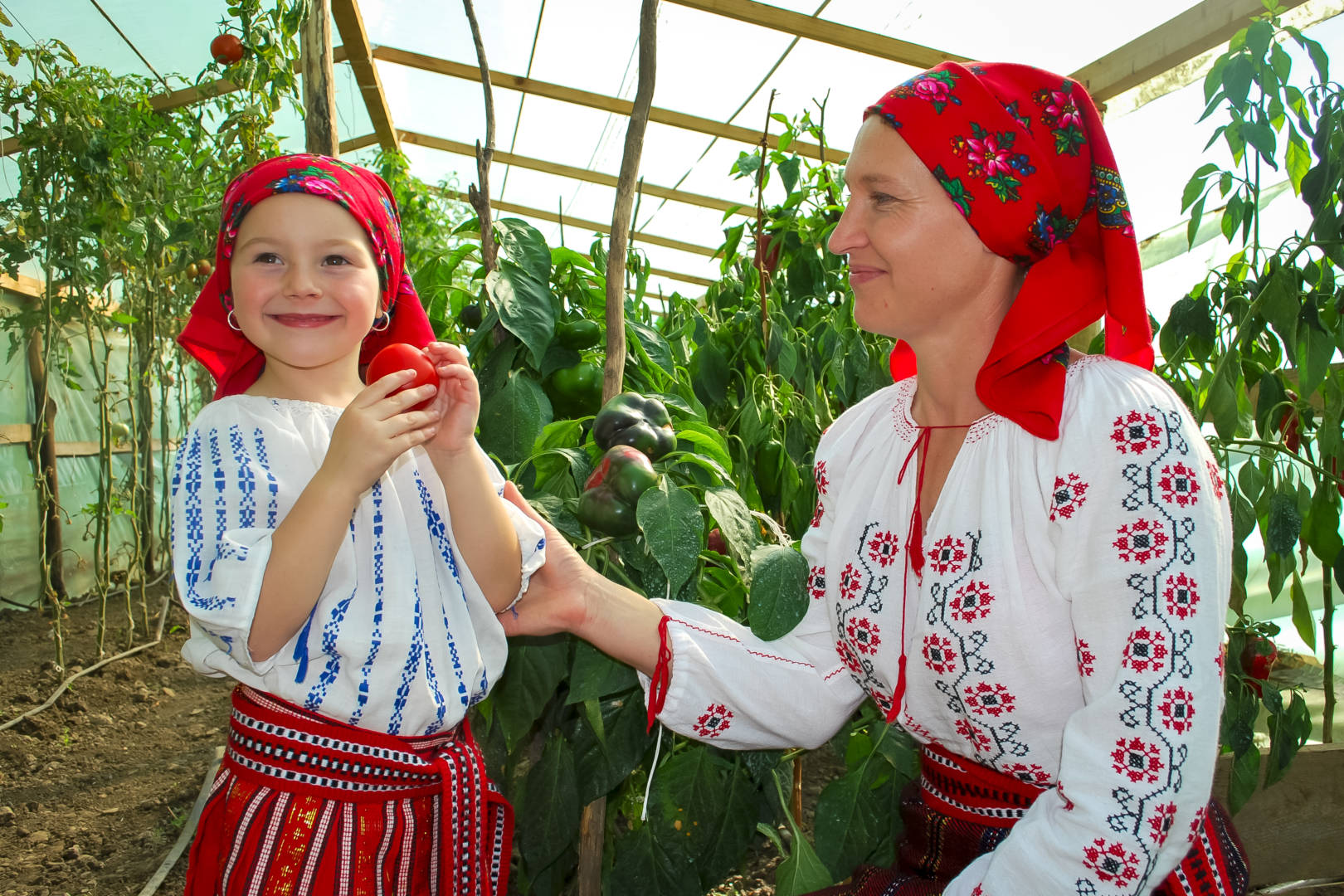 Vegetables sprout seeds of hope for a brighter future
Vegetables sprout seeds of hope for a brighter future
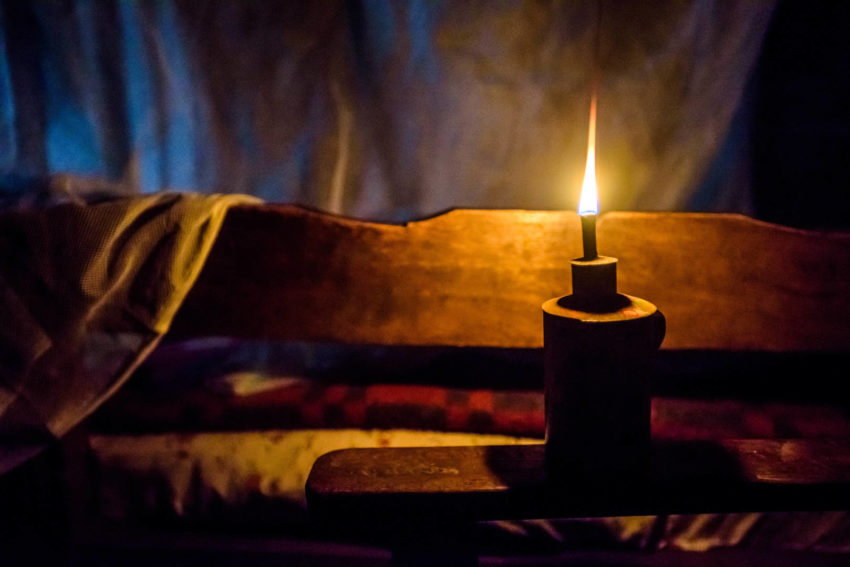 Since communism’s fall, Christmas in Romania is joyful
Since communism’s fall, Christmas in Romania is joyful
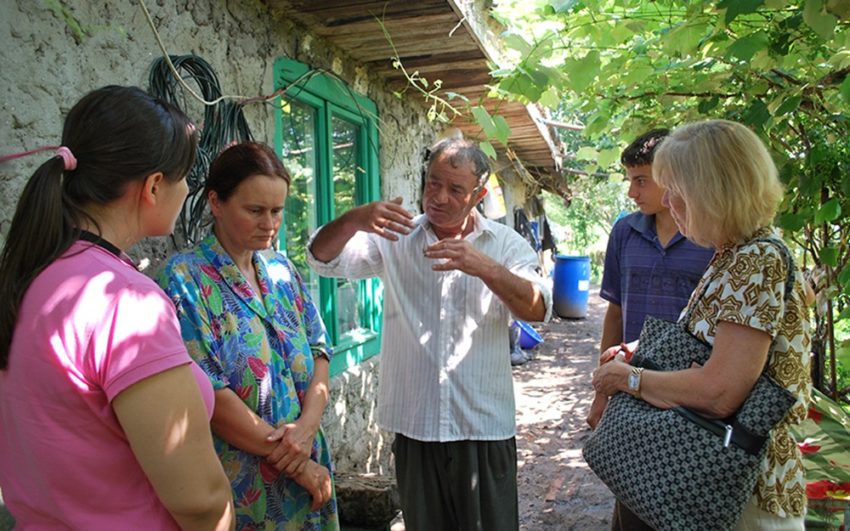 Some people just shine
Some people just shine